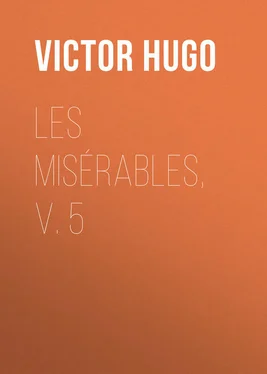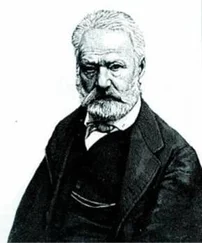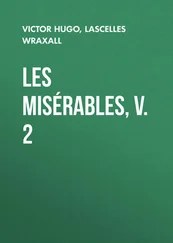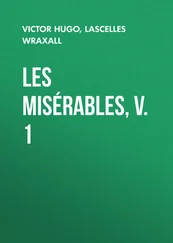Victor Hugo - Les Misérables, v. 5
Здесь есть возможность читать онлайн «Victor Hugo - Les Misérables, v. 5» — ознакомительный отрывок электронной книги совершенно бесплатно, а после прочтения отрывка купить полную версию. В некоторых случаях можно слушать аудио, скачать через торрент в формате fb2 и присутствует краткое содержание. Жанр: literature_19, foreign_antique, foreign_prose, на английском языке. Описание произведения, (предисловие) а так же отзывы посетителей доступны на портале библиотеки ЛибКат.
- Название:Les Misérables, v. 5
- Автор:
- Жанр:
- Год:неизвестен
- ISBN:нет данных
- Рейтинг книги:3 / 5. Голосов: 1
-
Избранное:Добавить в избранное
- Отзывы:
-
Ваша оценка:
- 60
- 1
- 2
- 3
- 4
- 5
Les Misérables, v. 5: краткое содержание, описание и аннотация
Предлагаем к чтению аннотацию, описание, краткое содержание или предисловие (зависит от того, что написал сам автор книги «Les Misérables, v. 5»). Если вы не нашли необходимую информацию о книге — напишите в комментариях, мы постараемся отыскать её.
Les Misérables, v. 5 — читать онлайн ознакомительный отрывок
Ниже представлен текст книги, разбитый по страницам. Система сохранения места последней прочитанной страницы, позволяет с удобством читать онлайн бесплатно книгу «Les Misérables, v. 5», без необходимости каждый раз заново искать на чём Вы остановились. Поставьте закладку, и сможете в любой момент перейти на страницу, на которой закончили чтение.
Интервал:
Закладка:
As we said above, it attacked in the name of the revolution – what? The revolution. It, this barricade, an accident, a disorder, a misunderstanding, an unknown thing, had, facing it, the constituent assembly, the sovereignty of the people, universal suffrage, the nation, the republic: and it was the Carmagnole defying the Marseillaise. A mad defiance, but heroic, for this old faubourg is a hero. The faubourg and its redoubt supported each other; the faubourg rested on the redoubt, and the redoubt backed against the faubourg. The vast barricade was like a cliff against which the strategy of the African generals was broken. Its caverns, its excrescences, its warts, its humps, made grimaces, if we may employ the expression, and grinned behind the smoke. The grape-shot vanished in the shapeless heap; shells buried themselves in it and were swallowed up; cannon-balls only succeeded in forming holes, for of what use is it bombarding chaos? And the regiments, accustomed to the sternest visions of war, gazed with anxious eye at this species of wild-beast redoubt, which was a boar through its bristling and a mountain through its enormity.
A quarter of a league farther on, at the corner of the Rue du Temple, which debouches on the boulevard near the Chateau d'Eau, if you boldly advanced your head beyond the point formed by the projection of the magazine Dallemagne, you could see in the distance across the canal, and at the highest point of the ascent to Belleville, a strange wall rising to the second floor and forming a sort of connecting link between the houses on the right and those on the left, as if the street had folded back its highest wall in order to close itself up. This was built of paving-stones; it was tall, straight, correct, cold, perpendicular, and levelled with the plumb-line and the square; of course there was no cement, but, as in some Roman walls, this in no way disturbed its rigid architecture. From its height, its thickness could be guessed, for the entablature was mathematically parallel to the basement At regular distances almost invisible loopholes, resembling black threads, could be distinguished in the gray wall, separated from each other by equal intervals. This street was deserted throughout its length, and all the windows and doors were closed. In the background rose this bar, which converted the street into a blind alley; it was a motionless and tranquil wall; no one was seen, nothing was heard, not a cry, nor a sound, nor a breath. It was a sepulchre. The dazzling June sun inundated this terrible thing with light, – it was the barricade of the Faubourg du Temple. So soon as you reached the ground and perceived it, it was impossible even for the boldest not to become pensive in the presence of this mysterious apparition. It was adjusted, clamped, imbricated, rectilinear, symmetrical, and funereal; science and darkness were there. You felt that the chief of this barricade was a geometrician or a spectre, and as you gazed you spoke in a whisper. From time to time if any one – private, officer, or representative of the people – ventured to cross the solitary road, a shrill faint whistling was heard, and the passer-by fell wounded or dead; or, if he escaped, a bullet could be seen to bury itself in some shutter, or the stucco of the wall. Sometimes it was a grape-shot, for the man of the barricade had made out of gas-pipes, stopped up at one end with tow and clay, two small cannon. There was no useless expenditure of gunpowder, and nearly every shot told. There were a few corpses here and there, and patches of blood on the pavement. I remember a white butterfly that fluttered up and down the street; summer does not abdicate. All the gateways in the vicinity were crowded with corpses, and you felt in this street that you were covered by some one you could not see, and that the whole street was under the marksman's aim.
The soldiers of the attacking column, massed behind the species of ridge which the canal bridge forms at the entrance of the Faubourg du Temple, watched gravely and thoughtfully this mournful redoubt, this immobility, this impassiveness, from which death issued. Some crawled on their stomachs to the top of the pitch of the bridge, while careful not to let their shakos pass beyond it. Brave Colonel Monteynard admired this barricade with a tremor. "How it is built," he said to a representative; "not a single paving-stone projects beyond the other. It is made of porcelain." At this moment a bullet smashed the cross on his chest and he fell. "The cowards!" the troops shouted, "Why do they not show themselves? They dare not! They hide!" The barricade of the Faubourg du Temple, defended by eighty men and attacked by ten thousand, held out for three days, and on the fourth day the troops acted as they had done at Zaatcha and Constantine, – they broke through houses, passed along roofs, and the barricade was taken. Not one of the eighty cowards dreamed of flying; all were killed with the exception of Barthélemy, the chief, to whom we shall allude directly. The barricade of St. Antoine was the tumult of the thunder; the barricade of the Temple was the silence. There was between the two barricades the same difference as exists between the formidable and the sinister. The one seemed a throat, the other a mask. Admitting that the gigantic and dark insurrection of June was composed of a fury and an enigma, the dragon was seen in the first barricade and the sphinx behind the second.
These two fortresses were built by two men, Cournet and Barthélemy: Cournet made the St. Antoine barricade, Barthélemy the Temple barricade, and each of them was the image of the man who built it. Cournet was a man of tall stature; he had wide shoulders, a red face, a smashing fist, a brave heart, a loyal soul, a sincere and terrible eye. He was intrepid, energetic, irascible, and stormy; the most cordial of men, and the most formidable of combatants. War, contest, medley were the air he breathed, and put him in good temper. He had been an officer in the navy, and from his gestures and his voice it could be divined that he issued from the ocean and came from the tempest; he continued the hurricane in battle. Omitting the genius, there was in Cournet something of Danton, as, omitting the divinity, there was in Danton something of Hercules. Barthélemy, thin, weak, pale, and taciturn, was a species of tragical gamin, who, having been struck by a policeman, watched for him, waited for him, and killed him, and at the age of seventeen was sent to the galleys. He came out and built this barricade. At a later date, when both were exiles in London, Barthélemy killed Cournet: it was a melancholy duel. Some time after that, Barthélemy, caught in the cog-wheels of one of those mysterious adventures in which passion is mingled, catastrophes in which French justice sees extenuating circumstances and English justice only sees death, was hanged. The gloomy social edifice is so built that, owing to maternal denudation and moral darkness, this wretched being, who had had an intellect, certainly firm and possibly great, began with the galleys in France and ended with the gibbet in England. Barthélemy only hoisted one flag, – it was the black one.
CHAPTER II
NOTHING TO DO IN THE ABYSS BUT TALK
Sixteen years count in the subterranean education of revolt, and June, 1848, knew a great deal more than June, 1832. Hence the barricade in the Rue de la Chanvrerie was only a sketch and an embryo when compared with the two colossal barricades which we have just described; but for the period it was formidable. The insurgents, under the eye of Enjolras, – for Marius no longer looked at anything, – had turned the night to good account: the barricade had not only been repaired but increased. It had been raised two feet, and iron bars planted in the paving-stones resembled lances in rest. All sorts of rubbish, added and brought from all sides, complicated the external confusion, and the redoubt had been cleverly converted into a wall inside and a thicket outside. The staircase of paving-stones, which allowed the top of the barricade to be reached, was restored, the ground-floor of the room of the inn was cleared out, the kitchen converted into an infirmary, the wounds were dressed, the powder scattered about the tables and floor was collected, bullets were cast, cartridges manufactured, lint plucked, the fallen arms distributed; the dead were carried off and laid in a heap in the Mondétour Lane, of which they were still masters. The pavement remained for a long time red at that spot. Among the dead were four suburban National Guards, and Enjolras ordered their uniforms to be laid on one side. Enjolras had advised two hours' sleep, and his advice was an order; still, only three or four took advantage of it, and Feuilly employed the two hours in engraving this inscription on the wall facing the wine-shop, —
Читать дальшеИнтервал:
Закладка:
Похожие книги на «Les Misérables, v. 5»
Представляем Вашему вниманию похожие книги на «Les Misérables, v. 5» списком для выбора. Мы отобрали схожую по названию и смыслу литературу в надежде предоставить читателям больше вариантов отыскать новые, интересные, ещё непрочитанные произведения.
Обсуждение, отзывы о книге «Les Misérables, v. 5» и просто собственные мнения читателей. Оставьте ваши комментарии, напишите, что Вы думаете о произведении, его смысле или главных героях. Укажите что конкретно понравилось, а что нет, и почему Вы так считаете.












